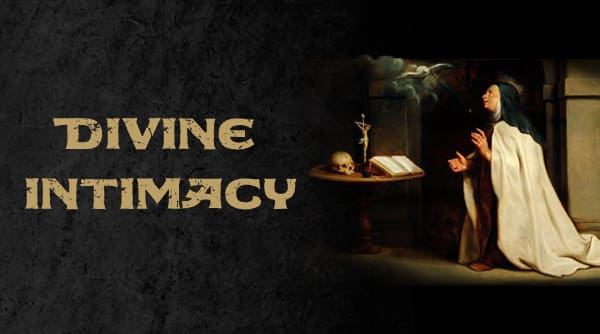Prudence and Rectitude
Presence of God– Teach me, O my God, the prudence which leads to You by the straight path of duty and truth.
MEDITATION
Prudence is not limited to suggesting good works to be done in order to attain sanctity, but it remains with us while we do these works, and enlightens us as to the best conduct to observe therein, according to the circumstances of the moment. For example, prudence tells us when to speak and when to be silent, when to act and when to wait, when to yield and when to resist, when and how to practice this or that virtue. Thus prudence is the great regulator of our whole life; it has been well termed the “auriga virtutum,” as it directs the exercise of all the other virtues. Prudence regulates the moral virtues that we may always observe a golden mean in our conduct by avoiding culpable excess in either direction—too much assurance or overtimidity, excessive activity or passivity, seeking our ease or performing penances which ruin our health. On the other hand, in the case of the theological virtues, for which there is no question of a golden mean, it is the task of prudence to direct us as to when and in what way they are to be practiced. Thus, for example, prudence will point out the dangers that threaten our faith and the way to avoid them; it will show us how we can have complete confidence in God, without fear of being presumptuous; it will teach us how to love God with all our heart, without prejudice to fraternal charity or the fulfillment of our duties; finally, it will tell us how to practice fraternal charity with great devotedness, avoiding any harmful imprudences.
We can truly say, therefore, that prudence is extremely useful and necessary in all things; it is the salt that ought to season all our acts. A soul detached from itself, centered on God alone, a recollected soul that does not let itself be distracted by the noise of the world, will easily and almost spontaneously follow the path of supernatural prudence, and by so doing, will reach God by a straight path, without deviations or loss of time.
COLLOQUY
 “O prudence, you are like a high mountain. Those whom the mountain shelters, live a healthy life and enjoy its pure air. From its height, they see and foresee everything they should do. So also, my God, the prudence which proceeds from You keeps the soul high above the clouds of passion and human considerations; it invigorates her virtue, and causes her to honor You in all her works, making her foresee everything, so that she can arm herself against temptation. O my God, give me this true upright prudence, which will lead me to union with You. Let it guide me in such a way that I shall never fail to perform Your works out of any motive of human respect or regard for any creature” (St. Mary Magdalen dei Pazzi).
“O prudence, you are like a high mountain. Those whom the mountain shelters, live a healthy life and enjoy its pure air. From its height, they see and foresee everything they should do. So also, my God, the prudence which proceeds from You keeps the soul high above the clouds of passion and human considerations; it invigorates her virtue, and causes her to honor You in all her works, making her foresee everything, so that she can arm herself against temptation. O my God, give me this true upright prudence, which will lead me to union with You. Let it guide me in such a way that I shall never fail to perform Your works out of any motive of human respect or regard for any creature” (St. Mary Magdalen dei Pazzi).
“Create a clean heart in me, O God, and renew a right spirit within me. Teach me Your ways, that I may follow Your truth. Give me temperance and prudence, justice and fortitude, for nothing is more profitable to men” (cf. Ps 51; Wisdom 8:7).
“O Jesus, supreme Goodness, I ask You to give me a heart so enamored of You that nothing on earth can distract it … a free heart, never seduced or enslaved, an upright heart which never goes astray” (St. Thomas Aquinas).
+
 Note from Dan: This post on prudence and rectitutde is provided courtesy of Baronius Press and contains one of two meditations for the day. If you would like to get the full meditation from one of the best daily meditation works ever compiled, you can learn more here: Divine Intimacy. Please honor those who support us by purchasing and promoting their products.
Note from Dan: This post on prudence and rectitutde is provided courtesy of Baronius Press and contains one of two meditations for the day. If you would like to get the full meditation from one of the best daily meditation works ever compiled, you can learn more here: Divine Intimacy. Please honor those who support us by purchasing and promoting their products.
Art for this post on prudence and rectitude: Ecstacy of St Mary Magdalene de Pazzi, attributed to Alessandro Rosi, circa 1670, PD-US author’s term of life plus 100 years or less, Wikimedia Commons. Father Gabriel of St. Mary Magdalen, mirror from open source material.




